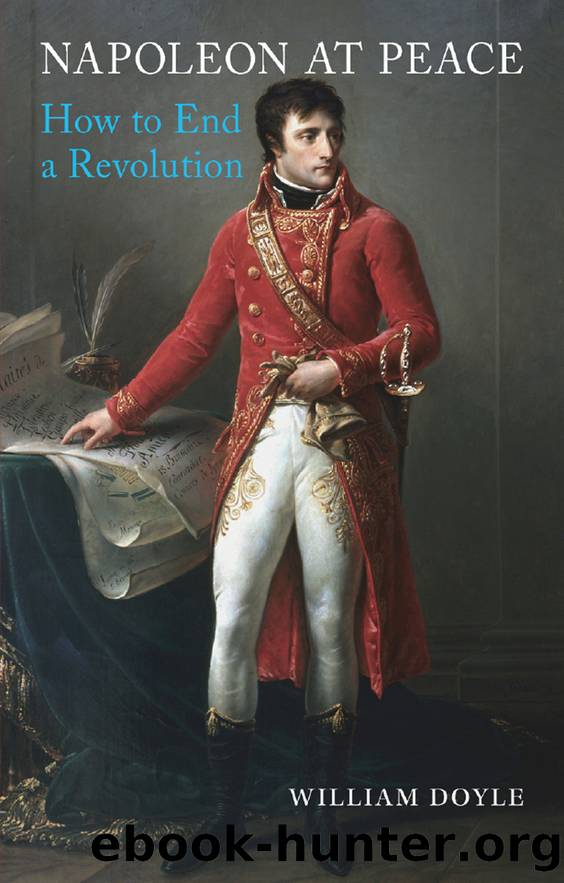Napoleon at Peace by William Doyle

Author:William Doyle
Language: eng
Format: epub
Publisher: Reaktion Books
The mass of the armies was totally detached from the bloody events that unhappy France had been the scene of; it knew almost nothing about them, and he seemed to think that the army, constantly in the hands of whoever was in power, would not influence party opinions, and would not take on any colour under a single direction.
Events would bear this out. The troops who had saved the Convention from the insurgents in Prairial were commanded by General Jean-Charles Pichegru, who had earlier led the successful invasion of the Dutch Republic. Royalists now began to speculate that if such a commander could be won over with his troops to the royalist cause, elections might not be the only route to a Bourbon restoration. Accordingly, over the summer, royalist agents began to sound him out. He was not unreceptive but, after a series of defeats over the winter, he resigned from the army. The search for another general willing to overthrow the Republic now focused on the new and startlingly successful commander in Italy.
The Directory, like the Thermidorean Convention before it, sought to combat the extremes of Jacobinism (or what it, and Napoleon afterwards, called âanarchyâ) and royalism by seesawing between them. The consistent aim of successive directors was a moderate republic supported by secure property owners. Neither Jacobins, with their record of confiscations, forced loans and terror, nor royalists, with their exiled king committed to returning confiscated and alienated national lands to their former ecclesiastical and noble owners, could be trusted to take power, even through the regular annual elections that were the supposed bedrock of the constitution. During the new regimeâs first months, Jacobinism came back into favour in order to consolidate the defeat of royalism in Vendémiaire. But this leftward swing only facilitated the egalitarian conspiracy of Babeuf by the spring of 1796, and in the aftermath of that plotâs discovery the forces of royalism were once more unmuzzled. The right-wing press, always better funded than radical journalism, was allowed to publish unhindered. Metropolitan conservatism, increasingly permeated by monarchists of varying stripes, found a meeting-point in the so-called Club de Clichy; while beyond the capital a loose network of âphilanthropic institutesâ spent months preparing for the first scheduled elections under the new constitution in the spring of 1797. Everybody knew that the built-in majority of former members of the regicide Convention could then be ousted. The directors were well aware of these preparations but, divided among themselves, they found few effective means of thwarting them. An oath of hatred both for âanarchyâ and royalism, imposed on all voters, proved completely ineffective. And so the legislative elections of 1797 were the freest, with the highest rates of participation, since 1791. They produced a landslide of support for a negotiated peace with the Republicâs monarchist enemies, and the election of many deputies committed to ânot five rulers, just oneâ.8 Pichegru now re-emerged as an elected deputy and was chosen to preside at the lower Council of Five Hundred. And
Download
This site does not store any files on its server. We only index and link to content provided by other sites. Please contact the content providers to delete copyright contents if any and email us, we'll remove relevant links or contents immediately.
| France | Germany |
| Great Britain | Greece |
| Italy | Rome |
| Russia | Spain & Portugal |
Fanny Burney by Claire Harman(26603)
Empire of the Sikhs by Patwant Singh(23086)
Out of India by Michael Foss(16853)
Leonardo da Vinci by Walter Isaacson(13336)
Small Great Things by Jodi Picoult(7143)
The Six Wives Of Henry VIII (WOMEN IN HISTORY) by Fraser Antonia(5515)
The Wind in My Hair by Masih Alinejad(5095)
A Higher Loyalty: Truth, Lies, and Leadership by James Comey(4964)
The Crown by Robert Lacey(4817)
The Lonely City by Olivia Laing(4802)
Millionaire: The Philanderer, Gambler, and Duelist Who Invented Modern Finance by Janet Gleeson(4478)
The Iron Duke by The Iron Duke(4356)
Papillon (English) by Henri Charrière(4274)
Sticky Fingers by Joe Hagan(4199)
Joan of Arc by Mary Gordon(4111)
Alive: The Story of the Andes Survivors by Piers Paul Read(4033)
Stalin by Stephen Kotkin(3966)
Aleister Crowley: The Biography by Tobias Churton(3640)
Ants Among Elephants by Sujatha Gidla(3467)
